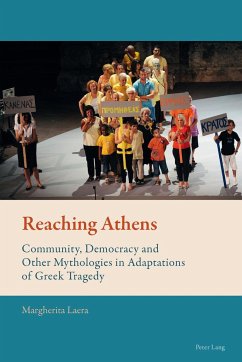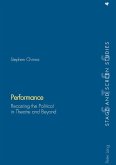Why do revivals and adaptations of Greek tragedy still abound in European national theatres, fringe stages and international festivals in the twenty-first century? Taking as its starting point the concepts of myth developed by Jean-Luc Nancy and Roland Barthes and the notion of the 'classical' outlined by Salvatore Settis, this book analyses discourses around community, democracy, origin and Western identity in stage adaptations of Greek tragedy on contemporary European stages. The author addresses the ways in which the theatre produces and perpetuates the myth of 'classical' Greece as the origin of Europe and how this narrative raises issues concerning the possibility of a transnational European community. Each chapter explores a pivotal problem in modern appropriations of Greek tragedy, including the performance of the chorus, the concept of the 'obscene' and the audience as the demos of democracy. Modern versions of Women of Troy, Hippolytus and Persians performed in Britain, France, Spain, Germany, Italy, Poland and Greece are analysed through a series of comparative case studies. By engaging with the work of prominent theatre-makers such as Mark Ravenhill, Michel Vinaver, Katie Mitchell, Sarah Kane, Krzysztof Warlikowski, Romeo Castellucci, Calixto Bieito and Rimini Protokoll, this volume offers a critique of contemporary democratic Europe and the way it represents itself onstage.
«Margherita Laera tackles a fundamental problem of our times: what do we do with our ancestors and with the myths of Greek tragedy and democracy? This is an ambitious project and an excellent piece of scholarship.» (Patrice Pavis, Professor of Theatre Studies, Korea National University of the Arts)
«This book articulates original, important and wide-ranging arguments with elegance and verve. A stimulating deconstruction of myth, in the Barthesian sense of that word.» (Carl Lavery, Senior Lecturer in Drama, Theatre and Performance, Aberystwyth University)
«Margherita Laera launches her complex and compelling study of recent adaptations into waters that, seemingly charted as 'the classical tradition', reveal themselves to be deep and churning Sargasso Seas of ideology, politics and mythology. [...] 'Reaching Athens' fills an important role as it explores areas that are often neglected or given short shrift [... and it] complicates the polemic in an extremely meaningful way [...] This invaluable work deserves a wide audience and should encourage further investigation of the ideological role of present-day adaptations and the ongoing mythologizing of ancient, selective affinities.» (Norma Jenckes, Theatre Research International 40.1, 2015)
«This book articulates original, important and wide-ranging arguments with elegance and verve. A stimulating deconstruction of myth, in the Barthesian sense of that word.» (Carl Lavery, Senior Lecturer in Drama, Theatre and Performance, Aberystwyth University)
«Margherita Laera launches her complex and compelling study of recent adaptations into waters that, seemingly charted as 'the classical tradition', reveal themselves to be deep and churning Sargasso Seas of ideology, politics and mythology. [...] 'Reaching Athens' fills an important role as it explores areas that are often neglected or given short shrift [... and it] complicates the polemic in an extremely meaningful way [...] This invaluable work deserves a wide audience and should encourage further investigation of the ideological role of present-day adaptations and the ongoing mythologizing of ancient, selective affinities.» (Norma Jenckes, Theatre Research International 40.1, 2015)








